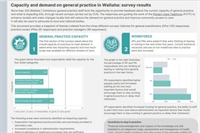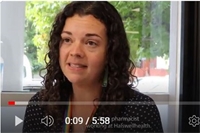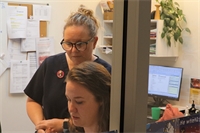28May
Primary Care Taskforce Reveals Findings on General Practice Capacity and Workforce Sustainability
In a comprehensive survey conducted by the Canterbury Clinical Network’s Primary Care Taskforce (PCTF), findings have highlighted significant pressures on general practice capacity in Waitaha Canterbury. The survey, which took place in June 2023, aimed to strengthen the understanding of current challenges and guide strategic actions to enhance healthcare accessibility and sustainability across the region.
The survey gathered insights from 105 General Practitioners, 81 Practice Nurses, and 48 Practice Managers, with responses from around 50% of Waitaha practices. It covered topics including practice capacity, workforce, initiatives currently in place to support healthcare provision, and where the PCTF should focus their efforts.
Key findings include:
- General practice capacity was deemed reasonable overall, but lower for proactive and preventative care. Rural practices reported lower overall capacity compared to urban ones.
- Significant factors affecting capacity included increased expectations for general practice to provide care previously handled by secondary care, increased administrative demands, and inefficient referral pathways.
- Workforce issues are notable, with high intentions to leave or retire among GPs and practice nurses, particularly in rural areas, within the next three to five years. Recruitment and retention are major concerns, compounded by vacancies in critical roles.
- Many practices have adopted initiatives like reserved same-day appointments, and phone consultations and the employment of additional non-clinical staff to help manage capacity.
- The survey responses also highlighted primary care funding issues. The PCTF has shared this information with other groups that are actively advocating in this area.
Dr Kim Burgess, Chair of the PCTF, emphasises the critical nature of these findings. "The survey highlights urgent areas of focus that require collaborative efforts across all levels of our health system to ensure that we can continue to provide local communities with access to effective and sustainable healthcare,” Dr Burgess said.
In response to the survey's insights into capacity and demand pressures in general practice, the PCTF and leaders across the system agreed on a set of priority actions to reduce administration, improve the interface between primary and secondary care, enhance workforce retention, facilitate greater involvement of allied health and other staff in practice teams, and promote greater collaboration across healthcare providers. These recommendations aim to address both immediate and long-term needs to ensure the sustainability of general practice in the region.
Delivery of these actions has progressed at pace, with:
- The development of two kete of resources, one to support practices adopting alternative approaches to managing their clinical inbox and a second guiding practices wanting to involve pharmacists in their practice team. Accompanying these resources are videos, webinars, and access to peers offering practical tips from their experience with making these changes.
- Primary and secondary care clinical leads collaborating to streamline problematic pathways and processes identified in the survey. This has resulted in the updating of the transfer of care document that focuses on how results are shared between clinicians and promoting this within secondary care, reformatting documents such as discharge letters to make them more user-friendly for general practice, and refining referral processes in areas such as community transfusion. There has also been a process set up for primary care clinicians to notify the Chief Medical Officer’s office of pathways that are unnecessarily burdensome.
- Piloting general practice employing medical students to work part-time as healthcare/clinical assistants.
The PCTF is committed to collaborating with local and national health partners to continue work on these priority actions. The focus for the next six months will be to strengthen the wellbeing and retention of the general practice workforce, continue work on streamlining the primary/secondary interface, and continue to share insights with those organisations advocating for primary care.
The full report is available here: Capacity & Demand: Waitaha | Canterbury general practice survey report April 2024
For further information, please contact Integration Lead Primary Care Taskforce
About the Author
Related

More than 200 general practice staff from across Waitaha | Canterbury have shared their thoughts and...
Read More >

A kete | toolkit of resources designed to support practices integrate a practice pharmacist into the...
Read More >

The CCN (Canterbury Clinical Network) Primary Care Taskforce is seeking feedback from general practi...
Read More >

Long after the last patient has been seen, many general practitioners (GPs) and nurse practitioners ...
Read More >

A group of health system staff and health consumers are pooling their experience and knowledge to ad...
Read More >

More than 200 general practice staff have taken the opportunity to provide feedback about the pressu...
Read More >